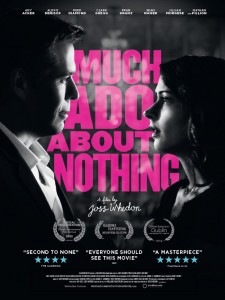Way back before the turn of the century, in that distant year of 1997, director James Cameron when asked what sort of project would he do next after producing the massively expensive and massively successful movie Titanic, he quipped to Larry king that he might  do a small art film. He did not, his next directorial effort was the wildly expensive and wildly successful Avatar.
do a small art film. He did not, his next directorial effort was the wildly expensive and wildly successful Avatar.
Joss Whedon however, after finishing principal photography on Marvel’s The Avengers, a fantastically expensive film, raised a miniscule amount of funds, contacted friends, and in just twelve days photographed his next film as a director, an adaptation of Much Ado About Nothing.
Time will tell just how financially successful this art house project will become, but the artistic merit in my opinion is unquestionable. Joss Whedon to my knowledge has only directed projects that he himself has written, and in this case the script was written long before Joss came along. Given that the text is hundreds of years old what is unmistakable about this film is that it is a Joss Whedon movie.
Much Ado About Nothing is a Shakespearean comedy about love, lust, honor, and masquerade. It has been adapted a number of times for the big screen, most recently in 1993 by Kenneth Branagh in a delightful and fun film that introduce the world to the luminescent actress Kate Beckinsale. Branagh’s film was film in Italy with period costumes, while Whedon adaptation is with a decidedly modern setting complete with iphones, cars, pistols, and Joss’s extraordinary house as the setting. Joss does preserve the text, and so this is still the Bard’s words re-interpreted for a new audience.
Joss’s brilliance comes in part from his use of the setting to further the plot and lend a credibility to the absurd nature of it convolutions. The Film deals with the return from war of Don Pedro and his men putting down a rebellion by his bastard brother Don John. Don John has been brought as a prisoner, but is treated with a gentlemen’s parole. There is a grand celebration and the characters all drink a lot. This makes their behavior something much more credible, and without changing the text Joss has re-invented it for a new sensibility.
The cast is stellar, and the editing quick and sure. This film works on every level and I laughed out loud even though I was quite familiar with the story. Joss has created, on a budget, a wonderful gateway drug for Shakespeare. If you are a fan of the Bard you are likely to appreciate this film and if you are unfamiliar with the paly this is the production to watch.
What changes that have been made, and there are always changed when you bring a play to the screen, such as the bold choice to have Conrade played by a woman, enhance this production and do not detract from it.
See this in the theater if you can, but do see it.
